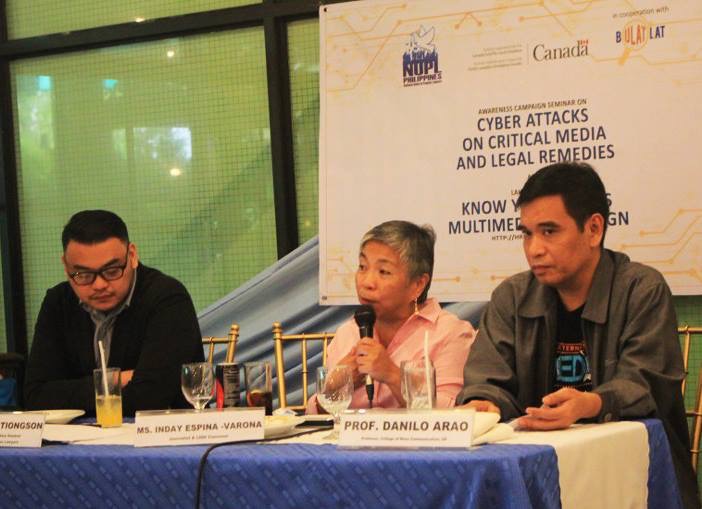
Since December, Bulatlat and several alternative media outfits have been experiencing a series of Distributed Denial of Service (DDoS) attacks, where the server of a website is maliciously being overloaded to shut it down.
By ALYSSA MAE CLARIN
Bulatlat.com
MANILA — It is time to fight back to defend press freedom.
This was the overall message during the recently-held forum by National Union of Peoples’ Lawyers and online news Bulatlat dubbed as ‘Cyber-attacks on Critical media and Legal Remedies’ as cyber-attacks against alternative media outfits and websites of progressive organizations continue to intensify.
Frank Lloyd Tiongson of the NUPL said those behind the attackers may be held to account as provided in the controversial Cybercrime Prevention Act, which covers offenses that compromise the confidentiality, integrity and availability of computer systems.
Since December, Bulatlat and several alternative media outfits have been experiencing a series of Distributed Denial of Service (DDoS) attacks, where the server of a website is maliciously being overloaded to shut it down. Sweden-based Qurium Media Foundation, which has been helping Bulatlat and several others to fend off attacks, has documented the same attack signature.
Bulatlat associate editor and University of the Philippines professor Danilo Arao said that while Bulatlat may not share the heavy traffic of that of the dominant media, the motives behind the attack could be its content. As such, these well-funded attacks prove to be state-sponsored.
Tiongson said that the attacks could fall under ‘system interference’ or intentional hindering with the functioning of a computer network by inputting, damaging, altering, or suppressing the computer program. Perpetrators, once identified and found guilty, may be sent behind bars with a fine between P200,000 to P10 million, depending if it is carried out by an individual or corporation, and if it is done deliberately or not.
However, since the process of filing charges for the violation of the Cybercrime Prevention Act is quite invasive as provided in the so-called “warrants,” media that are currently under cyber-attacks may still seek civil damages.
“That’s what a lot of governments and a lot of dictatorial regimes tend to misrecognize. When they suppress freedom of expression, they actually expose themselves to more pressure,” said Tiongson discussing the many legal boundaries being made to stifle press freedom.
Decriminalize libel
In the same vein, veteran journalist Inday Espina-Varona noted that it is high time to once again call for the decriminalization of libel, which carries a heavier penalty under the Cybercrime Prevention Act.
The law itself, she added, is “very very oppressive” as journalists have the burden of proving that their reports were written without malice. Varona said this deters journalists from truth-telling.
The Philippine’s criminal sanction for libel has been written off as ‘excessive’ by the United Nations Human Rights Committee (UNHRC) on October 2011 saying, “It is impermissible for a State party to indict a person for criminal defamation but then not to proceed to trial expeditiously – such a practice has a chilling effect that may unduly restrict the exercise of freedom of expression of the person concerned and others.”
UNHR believes that although it is only right for individuals to be protected from unethical journalism, the application of the criminal law should only be allowed for the most serious of cases, and that imprisonment is never an appropriate penalty. (Bulatlat.com)
The post ‘Time to fight back for alternative news under attack’ appeared first on Bulatlat.